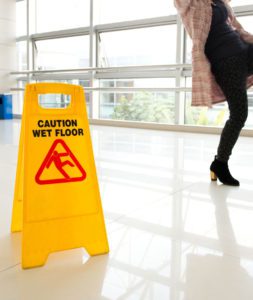Florida District Appellate Court Allows Inspection of Hospital Records in Slip and Fall Accident Suit

Businesses have a duty under state law to keep their premises reasonably safe for their patrons. If a store knows or should know that a part of the property is not safe and fails to fix the problem, the store can be liable for the injuries sustained by a patron. The hazards that can cause liability may include uneven surfaces, objects in a path, and slippery surfaces. Like all personal injury cases, in addition to showing the store failed in their duty to keep the premises safe, the injured person must show that the medical costs incurred were the result of the injury sustained.
After a suit is filed in state civil court, parties are required to exchange information that is relevant to the suit. This exchange is called “discovery,” and the information provided can be used at trial during the presentation to the fact-finder, or jury. In a Florida Third District Court of Appeals case, Publix Super Markets, Inc., vs. Luz Hernandez (3D14-2858), the court scrutinized motions related to discovery. A shopper filed suit against a grocery store after she sustained injuries from a slip-and-fall accident on the premises. The woman was treated by a physician at an orthopedic and neurosurgery office and underwent spinal surgery at the hospital. The injured shopper sought past and future medical expenses. Bills from both the medical office and hospital were provided to the grocery store during discovery.
During discovery, it was discovered that one hospital bill total was $18,708.70, paid in full by a payment of $6,490. Another invoice had the total hospital bill at over $54,000 with payment made in full of $12,384. A billing supervisor testified that the bills were for the same services. She testified during a deposition that the lower amount was the correct one, and she was not sure how the other was generated for the same services. Another subpoena was issued, but objections were filed by the injured shopper because it was not for the discovery of admissible evidence. The trial court granted the injured shopper’s motion, and the store appealed.
In its decision, the Court of Appeals noted that denials of discovery motions are not usually disturbed. However, the Court felt that a narrow exception applied, since the discovery concerned evidence the opposing party intended to use to help prove an essential element of their case. The court felt the questionable dual invoices would unfairly hamper the grocery store’s ability to defend itself. The Court of Appeals overturned the trial court verdict, and the grocery store was allowed to proceed with their discovery request.
The Florida premises liability attorneys at Weston & Pape have the experience you need to maximize the damages you deserve in your slip-and-fall case. Our attorneys are very familiar with the typical defenses used by insurance companies and at-fault parties, and we can aggressively pursue your case. For a free, confidential consultation, call our office at 772.266-5555.
More Blog Posts:
What Are the Effects of Brain Injury After an Accident?, South Florida Injury Lawyer Blog, July 31, 2015
Are Your Children At Risk for Playground Injury?, South Florida Injury Lawyer Blog, July 10, 2015

 Call Us Today
- It's Free
Call Us Today
- It's Free